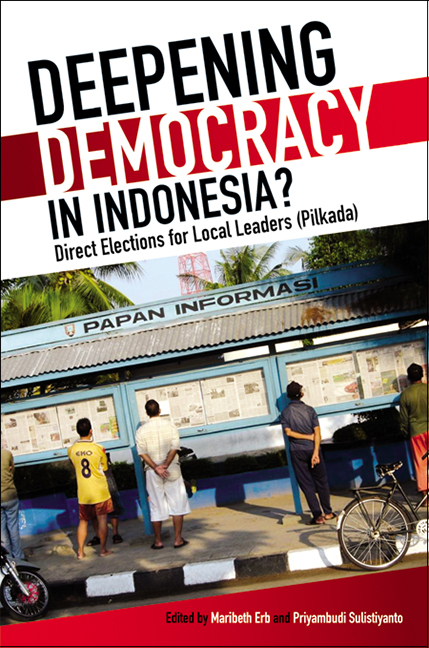Book contents
- Frontmatter
- Dedication
- Contents
- List of Tables
- List of Figures
- Contributors
- Acknowledgements
- Glossary
- 1 Indonesia and the Quest for “Democracy”
- 2 Pilkada Langsung: The First Step on the Long Road to a Dualistic Provincial and District Government
- Part I Political Parties, Politician Elites and the Voters
- Part II Media and Campaigns: Comparing Local and National Elections
- Part III Conflict, Ethnicity, and Political Divisions
- 12 Autonomy, Democracy, and Internal Conflict: The 2006 Gubernatorial Elections in Papua
- 13 Conflict and the Growth of Democracy in Manggarai District
- 14 The Return of the Sultan? Patronage, Power, and Political Machines in “Post”-Conflict North Maluku
- 15 Ethnic Politics and the Rise of the Dayak-Bureaucrats in Local Elections: Pilkada in Six Kabupaten in West Kalimantan
- 16 Bare-Chested Politics in Central Sulawesi: Local Elections in a Post-Conflict Region
- Index
15 - Ethnic Politics and the Rise of the Dayak-Bureaucrats in Local Elections: Pilkada in Six Kabupaten in West Kalimantan
from Part III - Conflict, Ethnicity, and Political Divisions
Published online by Cambridge University Press: 21 October 2015
- Frontmatter
- Dedication
- Contents
- List of Tables
- List of Figures
- Contributors
- Acknowledgements
- Glossary
- 1 Indonesia and the Quest for “Democracy”
- 2 Pilkada Langsung: The First Step on the Long Road to a Dualistic Provincial and District Government
- Part I Political Parties, Politician Elites and the Voters
- Part II Media and Campaigns: Comparing Local and National Elections
- Part III Conflict, Ethnicity, and Political Divisions
- 12 Autonomy, Democracy, and Internal Conflict: The 2006 Gubernatorial Elections in Papua
- 13 Conflict and the Growth of Democracy in Manggarai District
- 14 The Return of the Sultan? Patronage, Power, and Political Machines in “Post”-Conflict North Maluku
- 15 Ethnic Politics and the Rise of the Dayak-Bureaucrats in Local Elections: Pilkada in Six Kabupaten in West Kalimantan
- 16 Bare-Chested Politics in Central Sulawesi: Local Elections in a Post-Conflict Region
- Index
Summary
INTRODUCTION
The province of West Kalimantan is one of the most ethnically and religiously heterogeneous provinces in Indonesia. Apart from the Dayaks, Malays, and Chinese, the Madurese is one of the main ethnic groups in West Kalimantan. The Madurese were never a significant migrant group in numerical terms; however, they were highly visible because they lived separately from other ethnic groups, building their own ghettos. It is quite interesting that the 2000 Population Census does not mention “Dayak” as an ethnic category in West Kalimantan. The reason might be because the Dayak people always identify their ethnicity with their “sub-ethnic” groups, such as Iban, Taman, Kanayatn, Mualang, Desa, Ribun, Pesaguan, Simpakng, Jalai, etc. In fact, as an ethnic grouping, “Dayak” is an invented category, created by Dutch anthropologists and colonial administrators during the Dutch colonial period to depict the indigenous people of Borneo who were neither Malay nor Muslim; it was used in the 1930 Population Census. The 2000 Population Census was the first census after the 1930 census which included ethnic categories, but since it did not use the category “Dayak” in the demographic profile of West Kalimantan I refer to the data provided by military sources; in those sources the “Dayaks” count for 41 per cent of the population, while the Malays are 39 per cent, Chinese are 12 per cent, and the rest, labelled “Others” and including Javanese, Madurese, Buginese, make up 8 per cent of the population.
Unlike most provinces in Indonesia, where certain ethnic and religious groups are dominant, there is no single dominant ethnic or religious group in West Kalimantan. The Muslim population counts for 57.62 per cent, followed by Catholics 24.05 per cent, Protestants 9.96 per cent, and Buddhists 6.41 per cent of the population.2 This suggests that although Muslims count for more than half of the total population, they are not the real dominant religious group since the number of non-Muslims is quite substantial.
- Type
- Chapter
- Information
- Deepening Democracy in Indonesia?Direct Elections for Local Leaders (Pilkada), pp. 327 - 351Publisher: ISEAS–Yusof Ishak InstitutePrint publication year: 2009



